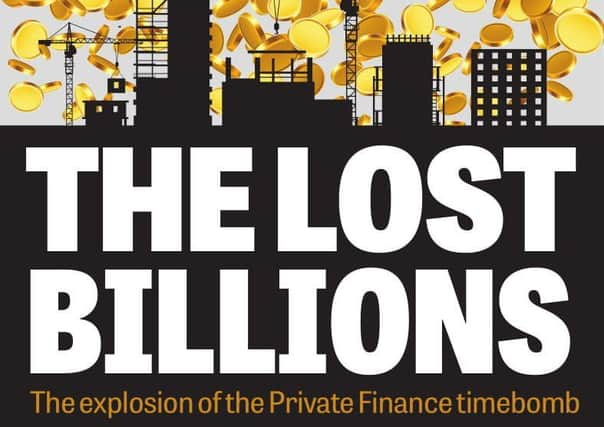Rocketing costs of PFI projects leave councils facing financial timebomb


That’s because of rocketing inflation costs, an investigation by JPI Media can reveal.
Many of the contracts signed off by councils with private firms in the late 1990s and early 2000s to replace crumbling school buildings were pegged to the retail price index (RPI), the now discredited inflation measure used to calculate rail fare hikes and student loan interest payments.
Advertisement
Hide AdAdvertisement
Hide AdThe governor of the Bank of England, Mark Carney, has admitted there are “known errors” in the RPI system and last year called for the UK Government to stop issuing bonds linked to it.


But that advice has come too late for many local authorities in Scotland which are now shelling out millions more in costs for schools that were built under private finance initiatives.
Costs of other Scottish PFI schemes, from prisons to hospitals, have also been rocketing since the deals were agreed.
A Scottish Government spokesman said PFI had left “taxpayers in Scotland liable for a £30 billion legacy of payments”.
Advertisement
Hide AdAdvertisement
Hide AdHe added: “The annual PFI repayment bill now exceeds £1 billion – nearly five times more than the Non-Profit Distributing (NPD) programme which we introduced and is proving far better value to the public purse.
“The funding of public infrastructure has vastly improved since 2007.
“We are working to ensure PFI contracts which have been inherited provide the best value for money for the taxpayer – and to ensure savings are achieved from existing contracts, wherever possible.”
The Scottish Government is understood to be eyeing a model of public-private partnerships pioneered by the Welsh Government.
Advertisement
Hide AdAdvertisement
Hide AdLike PFI, the so-called Mutual Investment Model sees private partners build and maintain public assets for a fee.
But the deals do not include services like cleaning, which have proved costly through PFI. The model also involves the public sector as a minority co-investor, taking a share of the profits.
Scottish Labour leader Richard Leonard has pledged to ban any further public-private finance deals if his party takes power.
“Scotland’s historical PFI deals have put unnecessary pressure on our NHS, our local government services and right across the public sector,” he said.
Advertisement
Hide AdAdvertisement
Hide Ad“That is why I have been clear that the Scottish Labour government that I lead will introduce a ban on new PFI/PPP/NPD deals.
“We will also take private contracts back in-house at the earliest opportunity to save the taxpayer money in the long term.”
The JPI Media investigations team has been looking into PFI contracts across the UK.
According to figures obtained from hundreds of public bodies, rocketing inflation and extra costs are set to add at least £4 billion to the overall price tag of PFI schemes.
Among its findings, the team found that:
Advertisement
Hide AdAdvertisement
Hide Ad• An NHS maternity unit built and run by a private company was closed after just 16 years but is still costing the taxpayer millions of pounds;
• A police force is trying to think up new uses for a mothballed custody suite it is still paying for;
• Expensive maintenance contracts have seen one police force billed £884 for an extra chair.
Trade union leaders have called for urgent action.
Unite assistant general secretary Gail Cartmail said the escalating costs of PFI were a “national scandal”.
Advertisement
Hide AdAdvertisement
Hide AdShe said: “The money that has poured into the pockets of profit-hungry financial institutions and private companies could have been much better spent directly on public service projects and infrastructure.
“PFIs are a rip-roaring example of out-of-control ‘bandit capitalism’.”